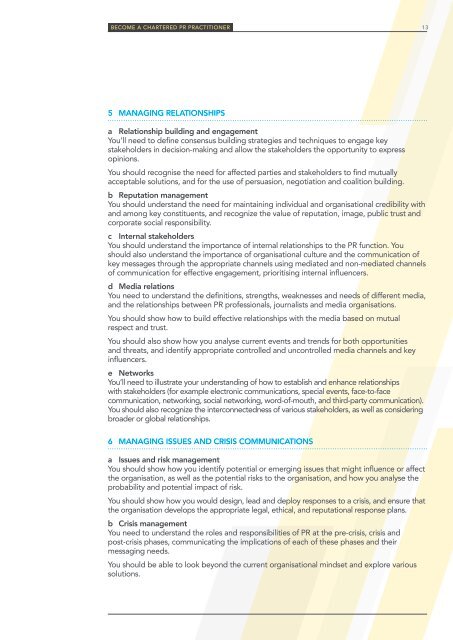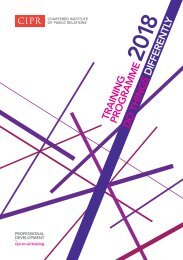Guide to Chartered 2018
You also want an ePaper? Increase the reach of your titles
YUMPU automatically turns print PDFs into web optimized ePapers that Google loves.
BECOME A CHARTERED PR PRACTITIONER 13<br />
5 MANAGING RELATIONSHIPS<br />
a Relationship building and engagement<br />
You’ll need <strong>to</strong> define consensus building strategies and techniques <strong>to</strong> engage key<br />
stakeholders in decision-making and allow the stakeholders the opportunity <strong>to</strong> express<br />
opinions.<br />
You should recognise the need for affected parties and stakeholders <strong>to</strong> find mutually<br />
acceptable solutions, and for the use of persuasion, negotiation and coalition building.<br />
b Reputation management<br />
You should understand the need for maintaining individual and organisational credibility with<br />
and among key constituents, and recognize the value of reputation, image, public trust and<br />
corporate social responsibility.<br />
c Internal stakeholders<br />
You should understand the importance of internal relationships <strong>to</strong> the PR function. You<br />
should also understand the importance of organisational culture and the communication of<br />
key messages through the appropriate channels using mediated and non-mediated channels<br />
of communication for effective engagement, prioritising internal influencers.<br />
d Media relations<br />
You need <strong>to</strong> understand the definitions, strengths, weaknesses and needs of different media,<br />
and the relationships between PR professionals, journalists and media organisations.<br />
You should show how <strong>to</strong> build effective relationships with the media based on mutual<br />
respect and trust.<br />
You should also show how you analyse current events and trends for both opportunities<br />
and threats, and identify appropriate controlled and uncontrolled media channels and key<br />
influencers.<br />
e Networks<br />
You’ll need <strong>to</strong> illustrate your understanding of how <strong>to</strong> establish and enhance relationships<br />
with stakeholders (for example electronic communications, special events, face-<strong>to</strong>-face<br />
communication, networking, social networking, word-of-mouth, and third-party communication).<br />
You should also recognize the interconnectedness of various stakeholders, as well as considering<br />
broader or global relationships.<br />
6 MANAGING ISSUES AND CRISIS COMMUNICATIONS<br />
a Issues and risk management<br />
You should show how you identify potential or emerging issues that might influence or affect<br />
the organisation, as well as the potential risks <strong>to</strong> the organisation, and how you analyse the<br />
probability and potential impact of risk.<br />
You should show how you would design, lead and deploy responses <strong>to</strong> a crisis, and ensure that<br />
the organisation develops the appropriate legal, ethical, and reputational response plans.<br />
b Crisis management<br />
You need <strong>to</strong> understand the roles and responsibilities of PR at the pre-crisis, crisis and<br />
post-crisis phases, communicating the implications of each of these phases and their<br />
messaging needs.<br />
You should be able <strong>to</strong> look beyond the current organisational mindset and explore various<br />
solutions.









